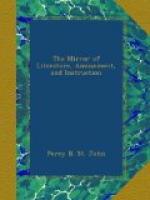It is surely no very good policy for an artist, jealous of his reputation, knowingly to leave his works unfinished. Without, however, detaining you, or your readers, by such obvious remarks, I shall resume my task, hoping that you will be able to find room for the following in your useful and entertaining miscellany.
In the first volume, p. 168, of the present work, we read: “She was once the beautiful and happy wife of Hamish Mac Tavish, for whom his strength and feats of prowess gained him the title of Mac Tavish Mhor.” This kind of style would scarcely be allowed to pass in Leadenhall-street. What is meant by for whom, with his immediately following, and then him a little after? Does not the author intend to say, that the strength, &c. of Mac Tavish gained him the title of Mac Tavish Mhor? If so, (and there can be no doubt of it from the context,) then he should have written the sentence thus: “whose strength and feats of prowess had gained him the title of Mac Tavish Mhor.”
“He gained the road, mounted his pony, and rode upon his way,” p. 183 of the same volume, is, in the latter part of it, another curious phrase. “He mounted his pony,” says the author. May we not suppose he rode upon it too? But he adds “rode upon his way.”
Again: “His reputed grandfather with his pockets stuffed out with Bank notes, would come to atone for his past cruelty, by heaping his neglected grandchild with unexpected wealth,” vol. 2., p. 87. We heap up wealth, but not persons with it, for that would hardly be kind. To load one with wealth is a common expression.
“Is it possible that the bold adventurer can fix his thoughts on you, and still be dejected at the thoughts that a bonny blue-eyed lass looked favourably on a less-lucky fellow than himself?” vol. 2, p. 136. Such is the question put by Middlemas to his friend Hartley, when speaking together on the subject of the interesting Menic Grey, and his projected Indian trip. But how could he ask if the bold adventurer fixed his thoughts on him, when it was the person addressed who entertained the idea of becoming one? and how, if the bold adventurer was dejected? when he had already distinguished him, taking the words in their proper application, as another individual in a general sense. It is altogether a singular specimen of abstruse phraseology. Then “fix his thoughts” “dejected at the thoughts.” Fie upon it!
“Hartley fell a victim to his professional courage, in withstanding the progress of a contagious distemper, which he at length caught, and under which he sank,” vol. 2, p. 367. If he withstood the progress of the disease, how could he fall a victim to it? The author should have said, “in his endeavours to withstand” or “arrest the progress of it.”




